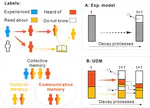Complex system modelling of human-water relationships
 Image credit: Unsplash
Image credit: Unsplash
Background
In river basins, water is a “common-pool” resource that is hydrologically connected. Agent-based modelling is a research tool that responds to social systems, especially by considering the interactions between different stakeholders. If we look at a socio-hydrological system, which consists of interactions between hydrological and social systems, at the basin scale, it is not in the interest to just maintain the natural hydrological cycle to its own devices, and it is also almost impossible to satisfy the demands of each stakeholders’ interest.
(1) Therefore, for such a complex system, our ultimate aim should be to focus more on finding solutions and development scenarios that enhance the resilience of the system based on the goal of overall sustainable development. (2) To this end, how we continuously address the challenges from the hydrological system would be a key theorical base, as it determines the way we think of the socio-hydrological system and find the approach that are more conducive to an overall increase in resilience in the future, based on a grasp of the development trends of the complex system from the many current solutions. (3) More specifically, at a time when stand-alone water engineering measures are becoming increasingly unsustainable, the integration of social systems and the development of effective institutional solutions are likely to be the resilience-oriented solutions to water governance in the future, and therefore the key role of institutions requires us to start with modelling the stakeholders of the basin.
Goals & Scientific questions
My research attempts to provide an initial exploration of these issues, from the concrete to the macro. Specifically, I seek to analyse the complexity of socio-hydrological systems through a subject-based model that addresses the following scientific questions of “three -tions”:
- Institution: what is the key role that institutions can play in sustainable water governance?
- Evolution: are there evolutionary patterns in socio-hydrological systems when addressing water stress?
- Solution: based on the complex interactions of socio-hydrological systems, how societies to govern common-pool water sustainably?
TimeLine
2019:
- I started learning [[interests_complex system modelling]] and [[interests_ agent-based model]].
2020 I published paper Improving Representation of Collective Memory in Socio-hydrological Models and New Insights into Flood Risk Management
2021:
- I published paper based on “complexity”: Decreased Virtual Water Outflows from the Yellow River Basin Are Increasingly Critical to China
